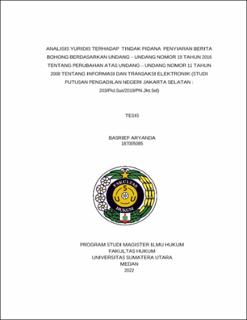| dc.description.abstract | Through social media, it is easier for someone to express opinions, opinions, ideas or ideas. However, this freedom will create potential conflicts and problems if there is no control from someone so as not to overuse their freedom in social networks. Freedom of expression, both orally and in writing, does not mean freedom without limitations, but rather a freedom that can be accounted for, and follows the prevailing norms. Freedom that does not follow the norm may lead to a Hate Speech or Hoax. Hoax is information in which it contains lies, slander, fabrications, and the like which are actually not true, but are made as if they are true among the public.
The type of research used in this research is normative legal research. The nature of this research is descriptive analysis. The approach method in this research uses a statutory approach, a case approach, and a conceptual approach. Based on the results of research on legal arrangements regarding broadcasting of false bettas according to positive law in Indonesia, there are five, namely the Criminal Code Article 310 paragraph (1), Article 311 paragraph (1), and Article 390, Law Number Information and Electronic Transactions Article 28 verse (1) and verse (2) Jo. Article 45, Law 1 of 1946 concerning Criminal Law Regulations in Article 14 and Article 15, Minister of Communication and Informatics Regulation Number 19 of 2014 concerning Handling Internet Sites with Negative Content, Law Number 32 of 2002 concerning Broadcasting. Criminal liability for someone who spreads fake news without knowing that the news is a hoax basically must fulfill all elements of criminal responsibility, namely the ability to be responsible, the existence of errors, and the absence of a reason to erase the crime. The application of the law to the crime of broadcasting false news based on the decision of the register number: 203/Pid.Sus/2019/PN.Jkt.Sel where the application of the law based on the judge's decision according to the author is not appropriate because it is not in accordance with the elements of the crime. | en_US |


